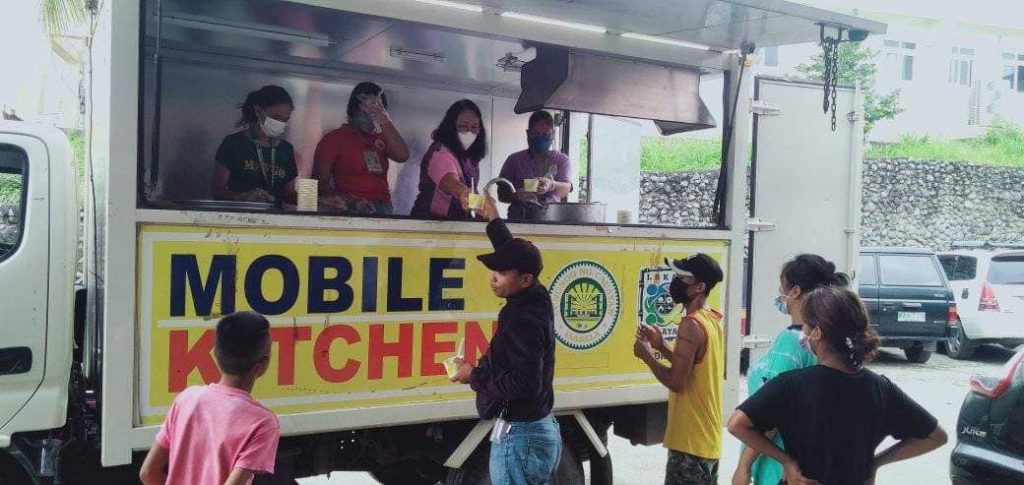Organization
City Government of Cauayan, Isabela
Best Practice Focus Area/s
Leadership, Strategy, Citizens / Customers
Year Implemented
2016
This is a Recognized Best Practice
Summary
The Food Bank Project was an initiative of the Cauayan City LGU to promote food security, food safety, and good nutrition. Launched in December 2016 in line with the localization of the United Nations (UN) Sustainable Development Goals, particularly that of ending hunger, the Food Bank acts as a food storage and distribution center of food catering especially to disadvantaged families and children, giving them free food daily to reduce hunger incidence and malnutrition. As the first hunger relief operation in the city and one of the LGU’s core social service programs for the marginalized, it has substantially contributed to the decrease in the malnutrition rate in the city in 2016, from 1.4% to 1.2%.
Background and Problem
For us living comfortably, the word “hunger” has a different connotation in the context of “world hunger.” According to the UN’s Hunger Report, hunger is the term used to define periods when populations are experiencing severe food insecurity. This means that large groups of people go for multiple days without eating. Several programs and projects are already implemented relative to this.
Like many countries, the Philippines has not been exempt from this humanitarian issue. It has been taking great strides to address it, especially in the city of Cauayan. They have already implemented many programs and projects to address hunger and malnutrition in their city. But to truly solve this issue, their city requires a project with long-term sustainability and funding, which is difficult to attain.

Solution and Impact
To solve the problems of sustainability and funding, the local government unit initiated collaboration efforts with the three pillars of society (local government, civil society, and the business sector) to develop innovations suited to the needs of the different sectors. And through these joint efforts, Cauayan City’s Food Bank was conceptualized.
The Food Bank project was implemented in line with the thrust of localizing the UN’s Sustainable Development Goals, particularly Goal 2: Zero Hunger. The LGU believes these small steps will contribute to attaining the objectives of this global advocacy. And with the help of the members of the City Council, Ordinance 2017-107 was enacted, providing guidelines for the donation, operation, storage, and distribution of healthy cooked meals to less fortunate members of the community through a Food Bank.
Moreover, all establishments engaged in selling retail or wholesale non-perishable goods such as canned goods and long-shelf-life foods are encouraged by Cauayan City’s Food Bank to deposit and donate such food items with them months before the expiration so that they may be cooked, processed, and given to indigent families. Nutritionists and dieticians ensure that such food is safe, not yet spoiled, and healthy before serving it to the identified beneficiaries. Moreover, the same ordinance provides that establishments found guilty of selling expired goods are to be penalized accordingly. With this, establishments are prevented from selling expired food items, ensuring food safety for the public.
Individuals, establishments, local retailers, companies, NGOs, and other charitable institutions are also encouraged to participate through donations, in cash or kind. These, in turn, supplement the city government’s funds, allowing for greater budget allocation towards the maintenance of facilities and the daily operations of the Food Bank.
Also, the food bank promotes volunteerism and collaboration among the people, the private sector, and the local government. In this way, it addresses hunger and malnutrition in the city and instills initiative and camaraderie among the city’s different constituents, creating possibilities for other welfare collaborations in the future.
Milestones/Next Steps
Since its creation, the Cauayan City Food Bank project has catered to 22,288 individuals, including children, out-of-school youth, and indigent families. This project has substantially contributed to the decrease in the malnutrition rate of the city in 2016, from 1.4% to 1.2%.
Also, this project led Cauayan City to become a Hall of Fame awardee in the 2016 National Nutrition Award. And last 2017, the City Nutrition Office conducted a study where it recorded a 0% malnutrition rate, making Cauayan City free from malnutrition.
And in June 2020, Food Bank on Wheels, a sub-project of the Food Bank, was activated in partnership with the Padyak para sa Kalusugan at Nutrisyon Program. When Cauayan City was placed under General Community Quarantine, the Food Bank on Wheels partnership catered to 1,500 individuals from six barangays composed of senior citizens, pregnant and lactating women, 4Ps members, PWDs, and malnourished children.
